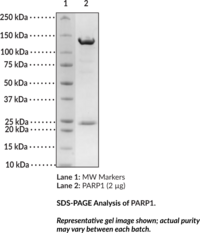Territorial Availability: Available through Bertin Technologies only in France
- Product Overview:
Poly(ADP-ribose) polymerase 1 (PARP1) is an ADP-ribosylating enzyme that has roles in DNA repair, maintenance of genomic integrity, and transcriptional regulation.{52890,52891} It is composed of an N-terminal DNA-binding domain (DBD) that contains the nuclear localization signal (NLS) and three zinc fingers that mediate PARP1 self-assembly and activation, a central automodification domain, and a highly conserved C-terminal catalytic domain.{52890,52892} PARP1 is ubiquitously expressed and localizes to the nucleus where it is recruited to sites of DNA damage induced by a variety of cellular stressors, including genomic, oxidative, inflammatory, or metabolic stress.{52893,52890} Binding of PARP1 to DNA single- or double-strand breaks activates its poly(ADP)-ribosylation (PARylation) catalytic activity. PARP1 PARylates itself, increasing its activity and recruiting additional DNA repair proteins to sites of damaged DNA, as well as PARylates other proteins, including transcription factors, to facilitate DNA damage repair.{52893,52890} PARP1 is subject to additional PTMs, including phosphorylation, methylation, and acetylation, that regulate its catalytic and DNA-binding activities.{52894} Increased PARP1 levels have been found in tumors isolated from patients with a variety of cancers, including soft tissue sarcoma and ovarian or squamous cell carcinomas, and are associated with decreased survival. Cayman’s PARP1 (human, recombinant) protein can be used for enzyme assay applications. This protein consists of 1,040 amino acids and has a calculated molecular weight of 139 kDa.
Cayman Chemical’s mission is to help make research possible by supplying scientists worldwide with the basic research tools necessary for advancing human and animal health. Our utmost commitment to healthcare researchers is to offer the highest quality products with an affordable pricing policy.
Our scientists are experts in the synthesis, purification, and characterization of biochemicals ranging from small drug-like heterocycles to complex biolipids, fatty acids, and many others. We are also highly skilled in all aspects of assay and antibody development, protein expression, crystallization, and structure determination.
Over the past thirty years, Cayman developed a deep knowledge base in lipid biochemistry, including research involving the arachidonic acid cascade, inositol phosphates, and cannabinoids. This knowledge enabled the production of reagents of exceptional quality for cancer, oxidative injury, epigenetics, neuroscience, inflammation, metabolism, and many additional lines of research.
Our organic and analytical chemists specialize in the rapid development of manufacturing processes and analytical methods to carry out clinical and commercial GMP-API production. Pre-clinical drug discovery efforts are currently underway in the areas of bone restoration and repair, muscular dystrophy, oncology, and inflammation. A separate group of Ph.D.-level scientists are dedicated to offering Hit-to-Lead Discovery and Profiling Services for epigenetic targets. Our knowledgeable chemists can be contracted to perform complete sample analysis for analytes measured by the majority of our assays. We also offer a wide range of analytical services using LC-MS/MS, HPLC, GC, and many other techniques.
Accreditations
ISO/IEC 17025:2005
ISO Guide 34:2009
Cayman is a leader in the field of emerging drugs of abuse, providing high-purity Schedule I-V Controlled Substances to federally-licensed laboratories and qualified academic research institutions for forensic analyses. We are certified by ACLASS Accreditation Services with dual accreditation to ISO/IEC 17025:2005 and ISO Guide 34:2009.





